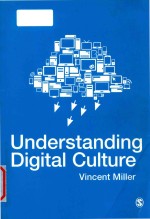

Understanding digital culturePDF电子书下载
- 电子书积分:11 积分如何计算积分?
- 作 者:Vincent Miller
- 出 版 社:SAGE
- 出版年份:2011
- ISBN:1847874979
- 页数:254 页
Introduction 1
Revolutionary Technologies? 2
Determinisms 3
The social determination of technology 4
Technological enablement 5
Base,superstructure,infrastructure 7
The structure of the book 9
1 Key Elements of Digital Media 12
Technical Processes 14
Digital 14
Networked 15
Interactive 15
Hypertextual/Hypermediated 17
Automated 19
Databased 20
Cultural Forms 21
Context (or lack of it) 22
Variability 24
Rhizome 26
Process 29
Immersive Experiences 30
Telepresence 31
Virtuality 32
Simulation 33
Case Study:What Are Video Games?A Conundrum of Digital Culture 39
Are video games ‘narratives’? 40
Are video games ‘games’? 41
Are video games ‘simulations’? 42
Conclusion 43
Further Reading 44
Notes 44
2 The Economic Foundations of the Information Age 46
Post-industrialism 49
Problems with the post-industrial thesis 51
The Information Society 52
Post-Fordism and Globalisation 54
Informationalism and the Network Society 57
The structure of networks 60
The space of flows and timeless time 61
Network economy and network enterprise 62
Weightless Economies,Intellectual Property and the Commodification of Knowledge 64
Weightless money 64
Weightless services 65
Weightless products 66
The advantages of a weightless economy 66
(Intellectual) property in a weightless economy 67
Information feudalism 69
Conclusion 70
Further Reading 71
3 Convergence and the Contemporary Media Experience 72
Technological Convergence 73
Regulatory Convergence 75
Media Industry Convergence 77
Concerns about media convergence 79
Convergence Culture and the New Media Experience 81
The creation of cross-media experiences 82
Participatory media culture 83
Collective intelligence 85
Producers,Consumers and ‘Produsage’ 86
Case Study:The Changing Culture Industry of Digital Music 88
The diginisation of music and its discontents 89
‘Mash-ups’ and the crisis of authorship in digital culture 90
Digital music cultures and music consumption 92
Conclusion 93
Further Reading 94
4 Digital Inequality:Social,Political and Infrastructural Contexts 95
‘Digital Divides’ and ‘Access’ 98
Domestic Digital Divides 99
Global Digital Divides 101
Mobile Phones,Access and the Developing World 104
Economic reasons 106
Social reasons 106
Legislative reasons 107
The Benefits of Mobile Telephony for the Developing World 107
Conclusion 109
Further Reading 109
5 ‘Everyone is Watching’:Privacy and Surveillance in Digital Life 111
The Changing Cultural Contexts of Privacy 113
Privacy as a legal construction:a contradiction? 114
Digital Surveillance:Spaces,Traces and Tools 116
Key tools of digital surveillance 117
The Rise of Surveillance:Causes and Processes 119
Security imperatives:surveillance and the nation-state 120
Surveillance,control imperatives and bureaucratic structures 121
Techno-logic 122
Commercial Imperatives and the Political Economy of Surveillance 122
Marketing and personal data collection 122
Databases,data-mining,and discourses 124
The power of profiling 125
Databases and profiling:pro’s and con’s 127
Why Care About a Surveillance Society? 128
Conclusion 132
Further Reading 133
6 Information Politics,Subversion and Warfare 134
The Political Context of Information Politics 135
ICT-Enabled Politics 138
Visibility 139
Internal organisation and mobilisation 141
External collaboration and coordination 141
Flexible organisation and ‘smart mobs’ 143
Permanent political campaigns:linear collaboration 143
An internet public sphere? 144
Digital Disobedience:ICT-Based Activism 147
ICTs and Mainstream Politics 148
Cyber Politics by Another Means:Cyber Warfare 151
Cyber warfare as network-centric warfare 152
Cyber warfare as information warfare 153
Cyber warfare as espionage 154
Cyber warfare as economic sabotage 154
Cyber warfare as critical infrastructure attack 155
Adjunct attacks 155
Conclusion:Networks and Power 156
Further Reading 157
Notes 158
7 Digital Identity 159
‘Objects to Think With’:Early Internet Studies and Poststructuralism 162
Personal Home Pages and the ‘Re-Centring’ of the Individual 164
Personal Blogging,Individualisation and the Reflexive Project of the Self 168
Social Networks,Profiles and Networked Identity 170
Avatar and Identity 173
Case Study:Cybersex,Online Intimacy and the Self 176
The late-modern context of love and intimacy 177
Cybersex:a novel from of intimacy 178
Conclusion 181
Further Reading 183
Notes 183
8 Social Media and the Problem of Community:Space,Relationships,Networks 184
Searching for Lost Community:Urbanisation,Space and Scales of Experience 185
Community,Globalisation,Technology and Individualism 187
‘Virtual’ Communities:The Next Step? 189
The virtues of virtual communities 190
The vices of virtual community 192
The reality of the situation 195
Network Societies,Network Socialities and Networked Individualism 197
The network society revisited 197
Networked individualism 199
The truth about networks 199
Case Study:Social Networking,Microblogging,Language and Phatic Culture 201
Technology,presence and the post-social 202
Language,technology and phatic communication 203
Conclusion 205
Further Reading 206
Notes 206
9 The Body and Information Technology 207
The Body,Technology and Society 208
The Posthuman 210
Cyborgs 211
Material as information 1:extropianism and disembodiment,or‘flesh made data’ 214
Material as information 2:technological embodiment or ‘data made flesh’ 216
Technology,Embodiment Relations and ‘Homo Faber’ 218
Embodiment relation and mobile technologies 220
Conclusion 222
Further Reading 223
Notes 223
Conclusion:Base,Superstructure and Infrastructure (Revisited) 224
References 227
Index 249
- 《主导英语 第5册》L.G.Alexander,R.H.Kingsbury,M.C.Vincent著;张德富等译注;张德富等校阅;郁明亮,陈雄尚审校 1984
- 《48天找到你爱的工作》(美)米丹恩(Dan Miller)著 2012
- 《积极思考的力量》(美)诺曼·文生·皮尔(Norman Vincent Peale)著;张美芳译 2003
- 《跨越边界 翻译·文学·批评》(美)米乐(J.Hillis Miller)著;单德兴编译;国立编译馆主译 1995
- 《动机式访谈法 帮助人们改变》(美)WILLIAMR.MILLER,(英)STEPHENROLLNICK著;郭道寰,王韵宇,江嘉伟译 2013
- 《急性腹部疾病的早期诊断》(英)柯普(Vincent Zachary Cope)撰;周世行译 1952
- 《精编临床神经眼科学 中文翻译版 原书第2版》(美)NeilR.Miller,NancyJ.Newman,ValérieBiousse编著 2009
- 《科学思维中的意象 创造20世纪物理学》(美)米 勒(Miller,A.I.)著;李继宏等译 1991
- 《财富引路人:成功基金经理的经济学解释及投资备忘录》(美)(Muhlenkamp Ron )米伦坎普;李国平译;(美)(Miller Wendy Muhlenkamp )米勒 2009
- 《美国企业精神》(美)米勒(Miller,L·M·)著;陈瑞蓉译 1985
